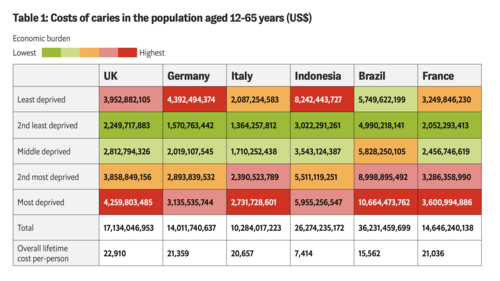![]()
29 April 2024
Advancing oral health in Germany: economic and health benefits of preventive care
Categories:Communication, Institutional, Publications

In Germany, focusing on preventive dental care has been fundamental in addressing oral health issues, particularly caries and periodontal diseases. This attention is crucial in a country that, despite its advanced healthcare system and better oral health outcomes compared to other nations, grapples with the high costs of dental treatments. Further emphasis on preventive measures, including the potential addition of fluoride to water supplies, could contribute to curb these expenses and improve oral health at a national level.
Germany stands out for its low prevalence of decayed, missing, or filled teeth among 12-year-olds, showcasing the effectiveness of its oral health strategies. However, the country faces the highest costs for dental crowns and implants, highlighting the financial implications of post-disease interventions. The cost of caries per person for the least deprived in Germany stands at $33,479, the highest in the six countries studied in the report. For the most deprived, the cost is $23,899, illustrating the significant socioeconomic disparities in oral health and the economic burden of dental diseases and the need for a stronger emphasis on preventive care to mitigate long-term costs and ensure equitable access to oral health services.
Socioeconomic determinants of oral health in Germany, as elsewhere, play a significant role in the development and management of caries and periodontal diseases. The total cost of caries in the German population aged 12-65 is estimated at $14 billion USD. The overall lifetime cost of caries per person in Germany is calculated at $21,359 USD, showing the substantial economic impact of dental diseases over a lifetime.
Lower socioeconomic status correlates with higher disease prevalence, underscoring the importance of targeted preventive measures. Moreover, commercial determinants, including the marketing of sugary foods, exacerbate oral health challenges, necessitating comprehensive strategies that address these root causes.
The Economist Impact white paper, commissioned by the EFP and supported by Haleon, highlights the cost-effectiveness of such interventions. By focusing on upstream measures like community water fluoridation and education on oral hygiene practices, Germany can further reduce the incidence of oral diseases and their associated treatment costs.
Professor Henrik Dommisch, president of the National Dental Society in Germany emphasises the transformative impact of preventive care, stating, "Investing in preventive dental care is not just a health imperative but a wise economic decision. By prioritising measures such as fluoridated toothpaste usage and regular dental check-ups, we can significantly lower the long-term costs of oral healthcare and improve the quality of life in our country, particularly for the most vulnerable communities."
The Economist Impact's white paper outlines that substantial costs can be saved over a 10-year period through preventive approaches. While specific return on investment (ROI) figures for Germany are not detailed, the pattern from the study indicates that investing in preventive care, such as improved oral hygiene and home care, could lead to significant cost savings and health benefits across the population.
"The shift towards preventive oral healthcare is a global movement gaining momentum, » said Professor Nicola West, EFP secretary general. « In countries like Germany, where the healthcare system sets a benchmark for excellence, the focus on preventive measures can serve as a model for others, showcasing how upstream interventions can lead to substantial health and economic benefits."
The white paper modelled the impact of reducing the annual caries progression rate by 30% through preventive interventions (like twice-a-day brushing with fluoridated toothpaste) and found the greatest decrease in per-person costs for caries management was observed in the most deprived group. This underscores the potential for preventive measures to bring about significant cost reductions, especially among the most vulnerable populations.
Germany illustrates the substantial benefits of shifting from curative to preventive oral healthcare. By investing in and expanding access to preventive measures, such as fluoride in water and comprehensive oral health education, Germany can further reduce the economic and health burdens of caries and periodontal diseases. This approach not only aligns with the WHO's recommendations for integrating oral care with non-communicable diseases (NCDs) care, it also offers a sustainable path towards levelling the playing field in oral health, ensuring all citizens, regardless of socioeconomic status, have access to the care they need.





